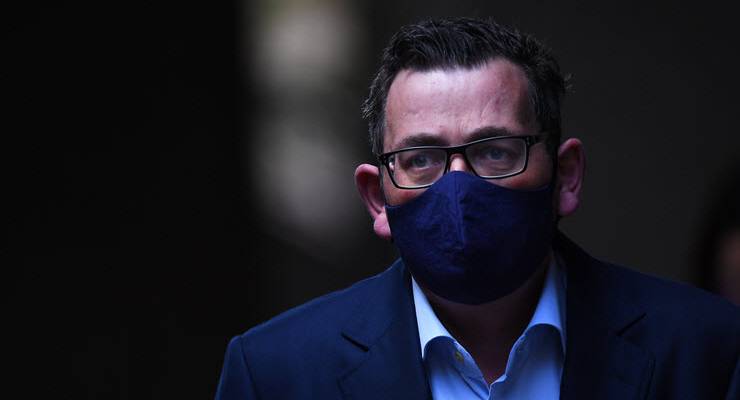
Victorian case records continue
Yesterday Australia recorded record-high new cases of coronavirus, with 502 new cases nationally — 484 were in Victoria. This morning, Victoria confirmed another 403 cases, and five new deaths, including a man in his 50s.
In a press conference yesterday, Victorian Premier Daniel Andrews said 90% of people who experienced symptoms continued about their lives for several days before getting tested and going into isolation — a trend he said was likely due to tenuous employment and the need to show up to a work shift.
The state government announced this morning it would extend its hardship payment scheme — any Victorian not entitled to sick leave will be paid $300 while they wait for test results.
Despite the high daily number of new cases, stage four lockdowns are not on the cards, because people who were going to work while sick under the current restrictions were likely to do the same under harsher restrictions.
Analysis by The Sydney Morning Herald has shown case numbers in NSW are following a similar trajectory to the early days of the current Victorian outbreak (although NSW chief health officer Kerry Chant said there were significant differences between the outbreaks).
NSW has recorded 19 new cases in the past day. Schools and childcare centres in NSW’s Hunter region have been closed for contact tracing and deep cleaning following clusters.
COVID-19 cuts lifespan
COVID-19 is slashing years of life expectancy from those who die from the disease, with symptoms lingering for months even in the young and healthy.
New data, released by the Australian Institute of Health and Welfare, found the Australians who died from COVID-19 lost more years of their expected lifespan on average than those who died of our three leading causes of death, which are coronary heart disease, dementia and stroke.
The disease strips on average 17 years of life expectancy from men who die, and 14 from women.
Young blood
A cocktail of antibodies could form a COVID-19 treatment, protecting vulnerable populations from getting sick from the virus, according to new research.
Antibodies have been collected from patients with severe symptoms and transfused into other patient’s blood to minimize the effects of the virus. Scientists at Columbia University in New York hope to begin human trials in October.
In the US, the Trump administration has made one of the largest vaccine investments yet, announcing a nearly US$2 billion contract with two pharmaceutical companies to develop 100 million doses of a coronavirus vaccine. The contract is with both Pfizer and German biotechnology company BioNTech.
Safety and efficacy trials of the vaccine are expected to begin this month.








“He added: “In terms of prevention, these could certainly substitute for vaccines, and again we’d be looking at the most vulnerable, for example, nursing home residents.”
This is from the Guardian link. Bring it on.
But watch for the secretive and powerful Industrial Medical & Health complex to put the kybosh on it. After all, this is preventative medicine and not “treatment” medicine. As you know, there is no money in healing you but rivers of gold in treating you.
As for Trump, how can anyone believe one single word that comes out of his mouth. The man is a complete harlequin. A stooge, put in place to give Americans and the rest of the world a mirror of their own stupidity and gullibility.
Crikey, please dig beneath the avalanche of covid misinformation and stand up to the barrage of MSM bull sh-it. There is karmic value if you have the gutz.
I am struggling a bit with what looks like an error in this paragraph (pasted below).
How is it Labor’s “traditional disdain for the poor”? Isn’t that Liberal’s traditional disdain? I thought labor was the only party who didn’t have traditional disdain for the poor, or have they been relieved of that task by the Greens and other progressives?
That is a progressive aim, a noble one, and it made the right’s politics more visible as a nihilism. If the manner of that has been regressive — the cop-led hard lockdown of nine Melbourne public housing towers showed Labor’s traditional disdain for the poor, economically below the home-owning worker-family — then that had to be fought within a support for the wider project.
On “karmic value” as mentioned above , at current market rates ,karmic value is worth about three fifths of not much at all.